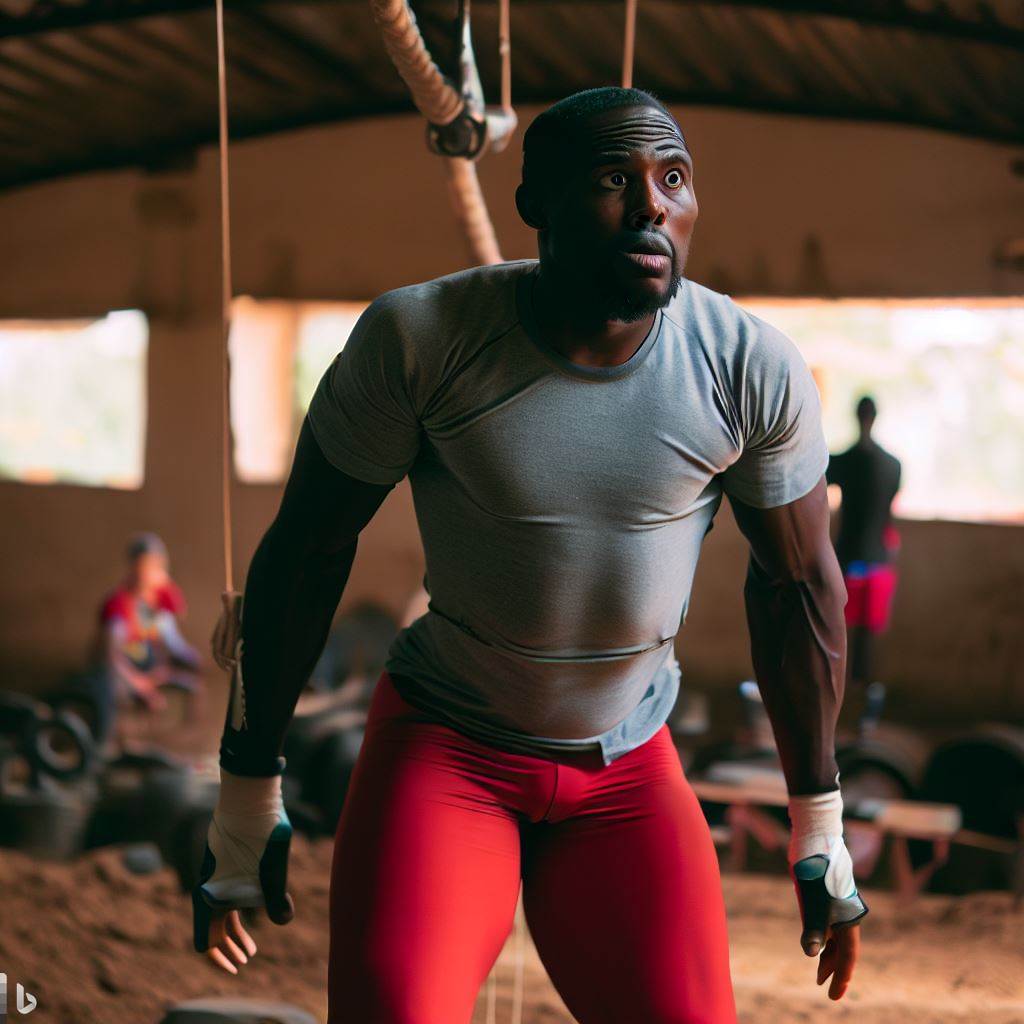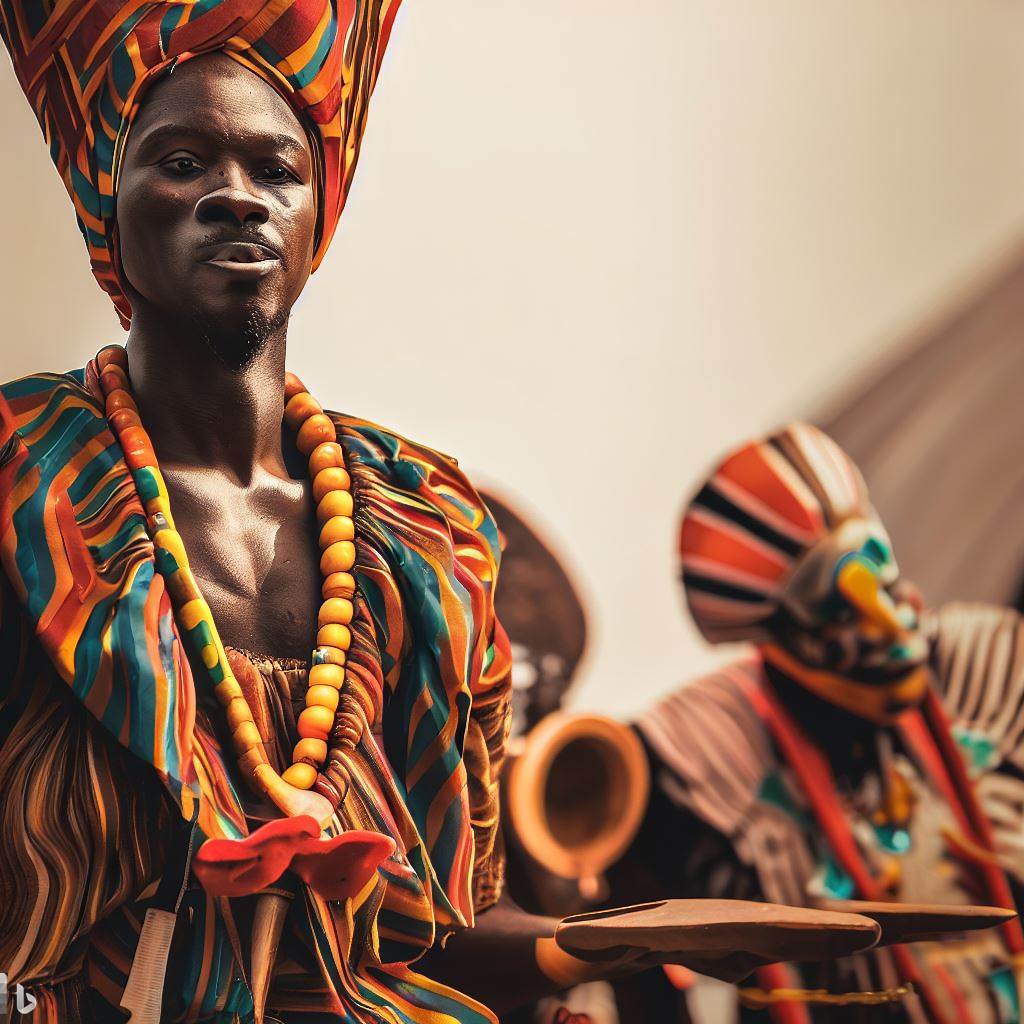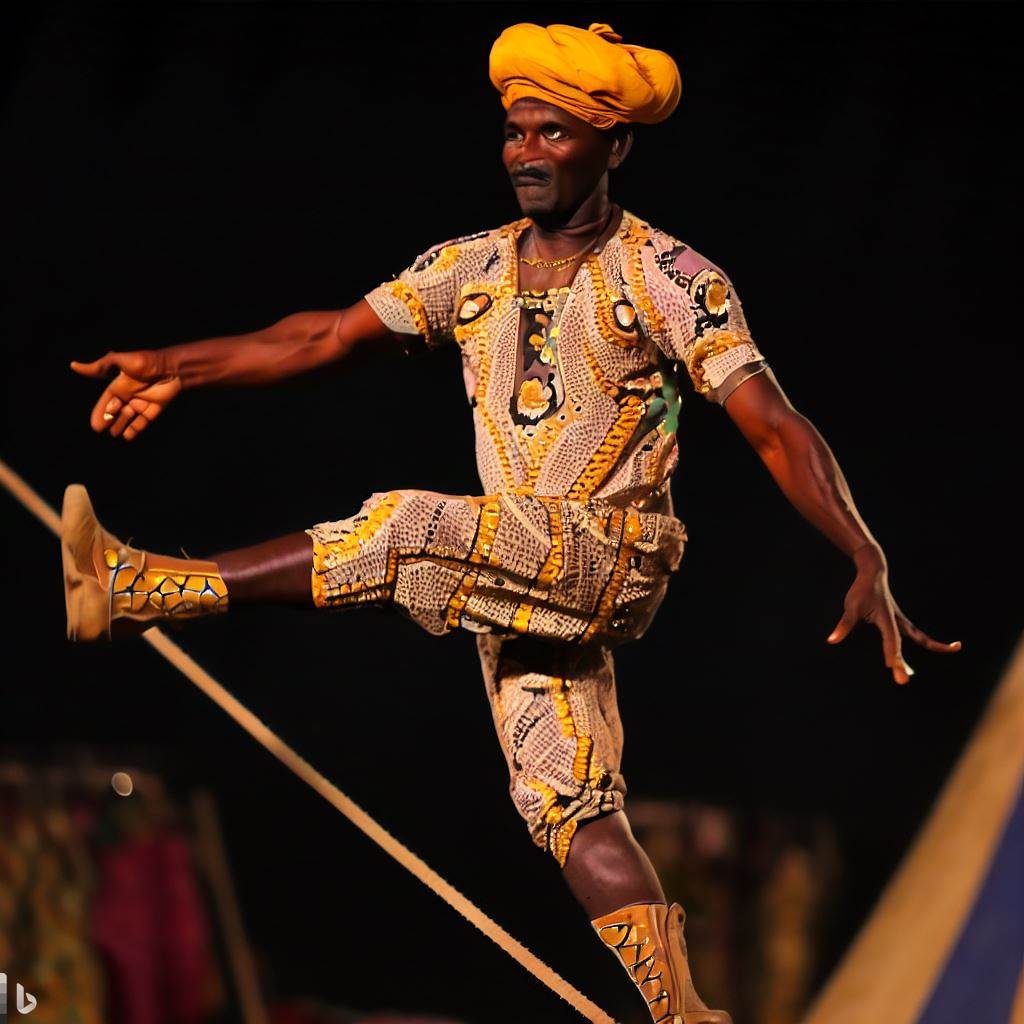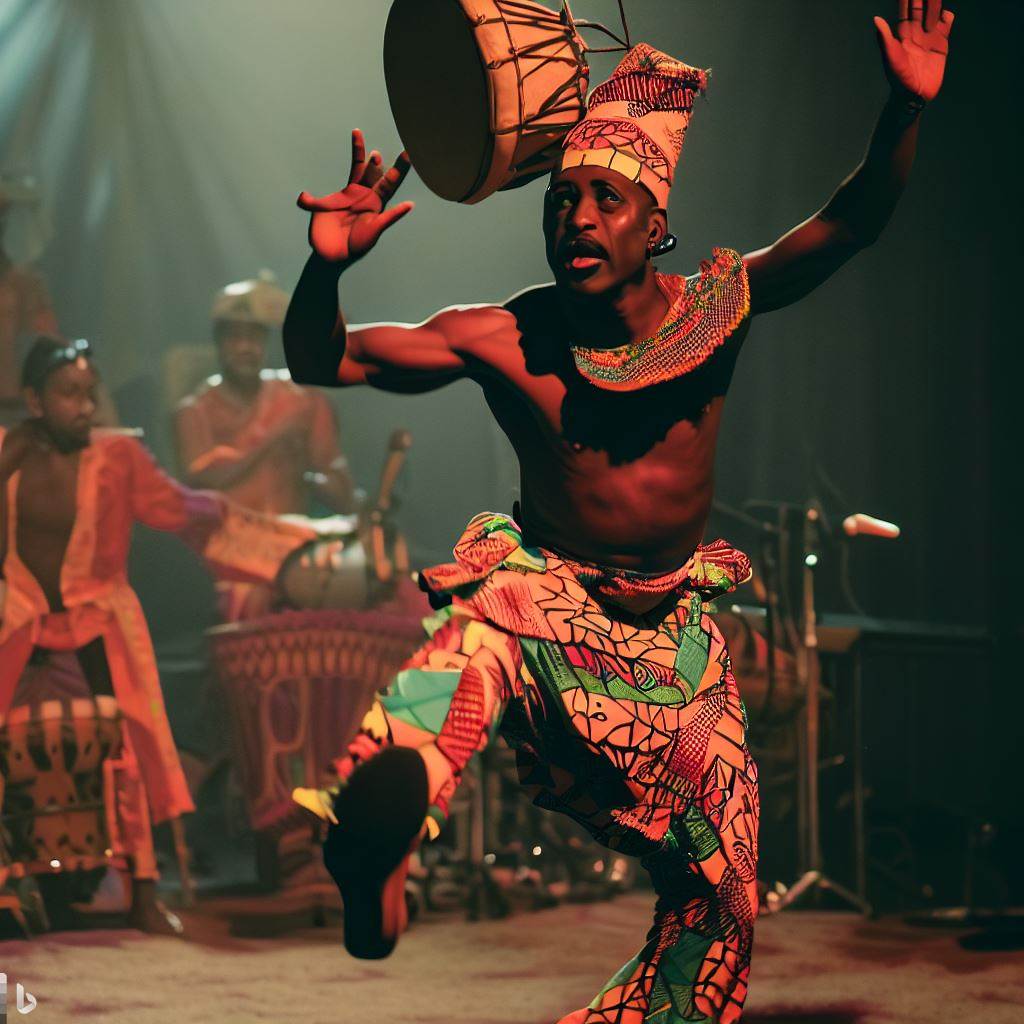Introduction
Training to become a circus performer in Nigeria is an exciting and challenging endeavor.
With the growing interest in the circus industry, opportunities for aspiring performers are on the rise.
Nigeria brings unique cultural aspects to circus performances, making it a fascinating and diverse experience.
In recent years, the circus industry in Nigeria has gained popularity and recognition.
More and more people are becoming interested in learning circus skills and honing their performance abilities.
This increased interest has paved the way for a thriving circus community in the country.
Nigeria’s rich cultural heritage adds a distinctive flavor to circus performances.
Traditional music, dance, and costume play a significant role in Nigerian circus acts, making them vibrant and captivating.
Performers incorporate elements of Nigerian culture into their routines, showcasing the diversity and beauty of the country.
Furthermore, Nigeria offers a plethora of opportunities for circus performers to showcase their talents.
From local festivals to international events, there are numerous platforms for aspiring performers to gain exposure and recognition.
This growing industry provides a promising avenue for those who are passionate about circus arts.
Training to become a circus performer in Nigeria offers a unique and enriching experience.
With the increasing interest in the circus industry and Nigeria’s vibrant cultural aspects, aspiring performers have a world of opportunities awaiting them.
Whether it be through local performances or global stages, Nigeria is a country where circus dreams can come true.
History of Circus in Nigeria
A. Highlighting the Historical Roots and Evolution
- During the pre-colonial era, various Nigerian tribes had their own unique performance traditions.
- These performances served religious, social, and entertainment purposes within the communities.
- With the arrival of colonialists, Nigerian performers began incorporating Western techniques and acts.
- Circus troupes started to showcase their skills at local fairs, exhibitions, and social events.
- Over time, the circus gained popularity across the country, reaching both urban and rural areas.
- Today, circus companies in Nigeria continue to push the boundaries of creativity and innovation.
B. Traditional Nigerian Performance Arts
- Igbo masquerade performances, known as “Mmanwu,” heavily influenced the circus in Nigeria.
- Yoruba cultural festivals, such as “Eyo” and “Gelede,” also had an impact on circus acts.
- These traditional performance arts provided the foundation for circus skills like balancing, contortion, and aerial acrobatics.
- Nigeria’s diverse cultural heritage contributes to the richness and uniqueness of its circus performances.
C. Notable Nigerian Circus Performers and Their Contributions
- Wale Balogun, a renowned Nigerian circus performer, is widely recognized for his exceptional juggling skills.
- Ada Ogun, a talented contortionist, has amazed audiences with her incredible flexibility and body movements.
- Samuel Dare, popularly known as “Samuel the Fire King,” is a fearless fire eater.
- These individuals have not only entertained audiences but have also inspired aspiring circus performers in Nigeria.
The circus in Nigeria has a rich history and continues to thrive today.
It has evolved from traditional Nigerian performance arts while incorporating Western influences.
The cultural heritage of Nigeria is evident in the unique circus skills and acts performed by talented individuals.
The contributions of notable Nigerian circus performers have elevated the art form and inspired future generations.
As the circus in Nigeria continues to evolve, it remains a symbol of artistic expression and entertainment.
Training Facilities and Programs
When it comes to training to become a circus performer in Nigeria, there are several training facilities and programs available.
These institutions play a crucial role in providing aspiring performers with the necessary skills and knowledge to excel in the circus arts.
A. Overview of Available Training Facilities
- Nigerian National Circus: This renowned institution offers comprehensive training programs for circus performers of all levels.
They have state-of-the-art training facilities equipped with specialized equipment. - Lagos School of Circus Arts: Situated in Lagos, this school focuses on providing quality education and practical training to aspiring circus performers. They offer diverse programs tailored to individual needs.
- Abuja Circus Academy: Located in Abuja, this academy offers a wide range of training programs to hone the skills of circus performers. Their well-structured curriculum ensures a holistic learning experience.
- Benin City Circus Training Center: This training center in Benin City provides aspiring performers with professional training in various circus disciplines. They have dedicated trainers and robust facilities.
- Port Harcourt Circus School: Situated in Port Harcourt, this school offers rigorous training programs for circus performers. They focus on building a strong foundation in circus arts.
B. Importance of Quality Education and Training
Quality education and training are paramount for individuals aspiring to become successful circus performers.
Here are a few reasons why:
- Skill Development: Quality education and training enhance the performers’ skills, allowing them to execute complex acts with precision and finesse.
- Safety: Proper training ensures the safety of performers by equipping them with techniques to minimize the risk of accidents and injuries.
- Artistic Growth: Education in circus arts helps performers explore their creativity, develop their unique style, and push the boundaries of their art form.
- Career Opportunities: Well-trained circus performers have more opportunities for professional growth, both within Nigeria and in international circuits.
- Professionalism: Quality training instills professionalism, discipline, and dedication in performers, enabling them to present their craft in a more polished manner.
C. Renowned Training Institutions and Their Curriculum
Several renowned training institutions in Nigeria offer well-structured curricula that cover various aspects of circus arts:
- Nigerian National Circus: Their curriculum includes aerial acrobatics, juggling, clowning, and various other circus disciplines. They also emphasize physical fitness and flexibility training.
- Lagos School of Circus Arts: This institution focuses on core areas such as aerial silks, trapeze, stilt walking, and fire performance. They provide a comprehensive understanding of performance techniques.
- Abuja Circus Academy: Their curriculum covers balance acts, tightrope walking, tumbling, and contemporary dance, along with theory classes on circus history and culture.
- Benin City Circus Training Center: With a holistic approach, this center offers training in wire walking, diabolo, hoop diving, and stage presence. They also conduct workshops on injury prevention.
- Port Harcourt Circus School: This school places emphasis on disciplines such as contortion, acrobatics, unicycle, and human pyramid formation. They also provide training in showmanship and audience engagement.
Nigeria boasts several training facilities and programs dedicated to nurturing aspiring circus performers.
Quality education and training are vital in this field, enabling performers to develop their skills, ensure their safety, and explore their artistic potential.
Renowned institutions in the country offer well-structured curricula that cover diverse circus disciplines, ensuring a holistic learning experience for aspiring performers.
Read: Exploring the Role of a Music Publisher in Nigeria’s Industry
Skills and Techniques
A. List of Skills and Techniques
Becoming a circus performer in Nigeria requires a wide range of skills and techniques.
Here are some of the most important ones:
- Acrobatics: Performers must master various acrobatic moves such as flips, somersaults, and handstands.
- Aerial Skills: This includes mastering various aerial apparatuses like the trapeze, silks, and hoops.
- Juggling: Circus performers must possess the ability to juggle multiple objects simultaneously.
- Tightrope Walking: Balancing and walking on a tightrope is an essential skill for circus performers.
- Clowning: Having the ability to entertain and make people laugh through comedic acts and gestures.
- Contortion: Circus performers must be flexible enough to contort their bodies into various shapes.
- High Wire Skills: Walking and performing tricks on a high wire require immense balance and control.
- Stilt Walking: This skill involves balancing and walking on wooden or metal stilts.
- Fire Skills: Some performers specialize in fire-based acts like fire eating and fire breathing.
- Mime: Circus performers may need to use mime techniques to convey emotions and actions.
B. Physical Demands and Dedication
Becoming a circus performer in Nigeria demands an incredible level of physical ability and dedication.
Each skill requires specific physical demands:
- Acrobatics: Agility, strength, balance, and stamina are crucial for executing acrobatic moves.
- Aerial Skills: Upper body strength, flexibility, and coordination are necessary for aerial performances.
- Juggling: Hand-eye coordination, dexterity, and precise timing are essential to become a skilled juggler.
- Tightrope Walking: Balance, core strength, focus, and fearlessness are required to walk on a tightrope.
- Clowning: Physical comedy requires energy, expressiveness, and the ability to connect with the audience.
- Contortion: Flexibility, strength, and body control are vital for performing contortionist acts.
- High Wire Skills: Excellent balance, concentration, and a steady nerve are paramount on the high wire.
- Stilt Walking: Balance, coordination, and adaptability are necessary to master stilt walking.
- Fire Skills: Performers must have fire safety knowledge, stamina, and the ability to handle intense heat.
- Mime: Expressive body language, control, and subtlety are crucial for effective mime performances.
C. The Importance of Discipline and Constant Practice
Discipline and constant practice are key to becoming a successful circus performer in Nigeria.
Here’s why:
- Acquiring Skills: Consistent practice helps performers master their skills and techniques.
- Building Stamina: Regular training builds physical stamina required for prolonged circus acts.
- Refining Techniques: Continuous practice allows performers to refine their movements for impeccable execution.
- Minimizing Risks: Discipline ensures performers follow safety protocols to prevent accidents during high-risk acts.
- Maintaining Fitness: Daily training routines help performers stay fit and in optimal physical condition.
- Developing Creativity: Discipline and practice fuel creativity, allowing performers to innovate and create unique acts.
- Overcoming Challenges: Maintaining discipline and practicing persistently helps performers overcome obstacles and push boundaries.
- Consistency in Performance: Regular practice ensures consistent and high-quality performances.
- Professionalism: Discipline instills professionalism, enabling performers to meet deadlines and deliver exceptional shows.
- Adapting to Changes: Circus performers need to constantly practice and adapt to new trends and audience preferences.
By recognizing the importance of these skills, physical demands, and dedicating oneself to discipline and practice, aspiring circus performers in Nigeria can strive for success in this unique and dynamic profession.
Read: A Day in the Life of a Nigerian Music Publisher

Challenges Faced by Aspiring Circus Performers in Nigeria
- Limited Training Facilities: Aspiring circus performers in Nigeria face numerous challenges in pursuing their career dreams.
The lack of sufficient training facilities and resources is one of the biggest obstacles. - Lack of Awareness: The general public in Nigeria has a limited understanding of circus arts and its potential as a legitimate profession.
This lack of awareness creates social stigmas and misconceptions about circus performers. - Financial Constraints: The financial challenges faced by aspiring circus performers in Nigeria cannot be overlooked.
The cost of training, acquiring equipment, and traveling for performances can be overwhelming, making it difficult for many talented individuals to pursue their passion. - Limited Job Opportunities: The lack of job opportunities is another significant challenge faced by aspiring circus performers.
The demand for circus shows and performances in Nigeria is relatively low, leading to a limited number of opportunities for these individuals to showcase their talents. - Cultural Perceptions: In Nigeria, traditional cultural perceptions often prioritize more conventional career paths, leading to societal pressure and discouragement for those pursuing circus arts.
This further increases the challenges for aspiring circus performers. - Skill Development: Developing the necessary skills to become a successful circus performer is a time-consuming process.
Without proper training programs and mentorship, aspiring performers find it challenging to attain the required level of expertise.
Aspiring circus performers in Nigeria face numerous challenges, including limited training facilities, lack of awareness, financial constraints, and limited job opportunities.
To conquer these challenges, the government, society, and performers must collaborate, enhancing infrastructure, raising awareness, and offering support.
Read: Sound Editing: Nigeria Versus the Global Scene
Success Stories
A. Stories of Nigerian circus performers who have achieved success
Nigerian circus performers have defied the odds to achieve remarkable success in their careers.
One such inspiring story is that of Ahmed Ali, who started as a young acrobat with dreams of greatness.
B. Journey, struggles, and accomplishments
Ali’s journey began in a small town in Northern Nigeria, where he discovered his passion for circus arts.
Despite facing numerous challenges, such as lack of resources and societal prejudice, Ali persevered.
Through sheer determination and hard work, Ali honed his skills and soon caught the attention of international circus directors.
C. Mention awards, recognition, and international exposure they received
His incredible performances and unparalleled talent earned him several awards and recognition. Ali’s first major accomplishment was winning the prestigious African Circus Competition in Lagos.
His jaw-dropping acrobatic routines and fearless feats impressed the judges and the audience alike.
Following his success at the national level, Ali set his sights on international exposure.
He participated in various circus festivals and competitions around the world, showcasing Nigeria’s rich artistic heritage.
Ali’s performances were met with standing ovations and critical acclaim from audiences across the globe.
In recognition of his talent and contribution to the circus industry, Ali was invited to perform at Cirque du Soleil.
This invitation was an incredible honor for Ali, as Cirque du Soleil is renowned for its world-class performers.
Performing with the prestigious company opened doors to even greater success for Ali.
He became the first Nigerian circus performer to tour with Cirque du Soleil, performing in sold-out shows in Las Vegas and Paris.
Through their journeys, struggles, and ultimate accomplishments, these performers have paved the way for a brighter future for circus arts in Nigeria.
Read: Career Path: How To Be A Professional Translator in Nigeria
Opportunities and Future of Circus in Nigeria
A. Current Opportunities and Potential Growth in the Circus Industry
- Nigeria is witnessing a growing interest in circus arts, with numerous training programs and schools emerging.
- These training programs are providing opportunities for aspiring performers to learn and showcase their talents.
- The government and private organizations are investing in the circus industry, supporting its growth and development.
- Circus arts have the potential to become a popular form of entertainment in Nigeria.
- Local communities and organizations are recognizing the value of circus arts, leading to increased support and funding.
- The circus industry in Nigeria is attracting attention from international circus companies and artists.
- There is a demand for Nigerian circus performers to collaborate with international circus companies and participate in prestigious festivals.
- These collaborations can provide exposure and networking opportunities for Nigerian performers, boosting their careers.
B. Collaborations with International Circus Companies and Festivals
- Nigerian circus performers have started collaborating with renowned international circus companies, such as Cirque du Soleil.
- These collaborations allow Nigerian performers to learn from world-class professionals and gain valuable experience.
- Participation in international circus festivals exposes Nigerian performers to a wider audience and diverse styles of circus arts.
- Through these collaborations, Nigerian circus performers are able to showcase the rich cultural heritage of their country.
- Collaborations with international circus companies and festivals provide opportunities for cultural exchange and learning.
- They also contribute to the growth and recognition of the Nigerian circus industry on a global scale.
C. Positive Impact of Circus Arts on Cultural Preservation and Tourism
- Circus arts have the power to preserve and promote Nigerian cultural traditions and practices.
- Traditional circus acts incorporating local music, dance, and costumes help preserve Nigeria’s cultural heritage.
- By showcasing their cultural identity through circus arts, Nigerians are able to celebrate their diversity.
- Circus performances attract tourists, who are interested in experiencing the unique blend of entertainment and culture.
- As the Nigerian circus industry grows, it can become a significant contributor to the country’s tourism sector.
- Tourists are drawn to the vibrant and colorful performances, creating economic opportunities for local communities.
- The positive impact of circus arts on cultural preservation and tourism can also foster national pride and unity.
The opportunities for circus performers in Nigeria are on the rise.
The industry is witnessing growth, with support from the government, private organizations, and international collaborations.
As the circus arts gain recognition, they have the power to showcase Nigeria’s cultural heritage, attract tourists, and contribute to the country’s overall development.
With the right investment and continued promotion, the future of the circus industry in Nigeria looks promising.
Conclusion
This blog post highlighted the process of training to become a circus performer in Nigeria. We discussed the various skills and disciplines required, such as acrobatics, juggling, and aerial acts.
We also explored the challenges and opportunities in the industry, including the lack of resources and recognition.
Despite these obstacles, aspiring individuals should be encouraged to pursue their dreams of becoming circus performers in Nigeria.
With passion, dedication, and the right training, they can overcome any hurdles and achieve success in this unique field.
Moreover, the future of circus arts in Nigeria looks promising.
As more people become aware of the incredible talent and creativity within the country, the demand for circus performances and trained performers is likely to increase.
This opens up opportunities for individuals to showcase their skills, entertain audiences, and contribute to the growth and development of the circus arts scene in Nigeria.
So, if you have a passion for circus arts and a dream of becoming a performer, don’t let anything hold you back.
Take that leap of faith, seek out the necessary training and support, and embrace the exciting journey towards a career in the circus industry.
The possibilities are endless, and the future is bright for circus performers in Nigeria.




